‘The search for something new is in the past’: Kazan residents shown weddings of Tatarstan peoples
Seven national wedding rituals were presented at Gorky Park as part of Tree of Life project
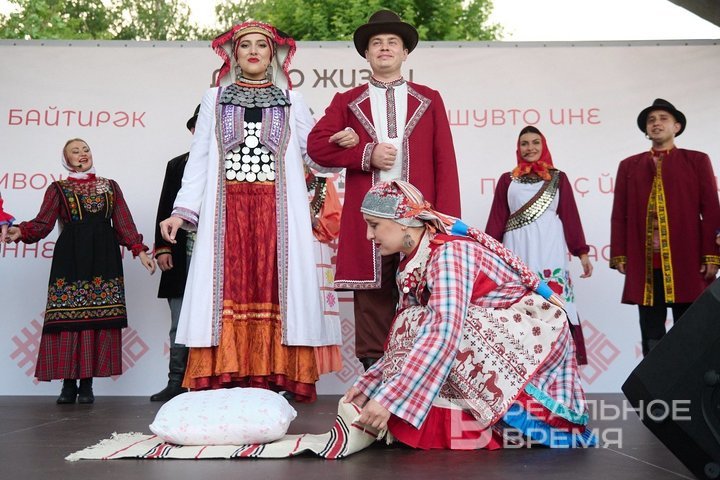
The first event of the educational project Tree of Life was held in Kazan where residents and tourists were introduced to the weddings of peoples of Tatarstan. National wedding ceremonies were presented on 3 July at Gorky Park of Culture and Leisure. Consul General of Turkey in Kazan Ugur Yilmaz was the guest of honour of the evening. As the youth assure, traditions are preserved but locally, although there is some interest in ethnic rituals.
People from Saba, Kukmor and other Tatarstan residents
The Tree of Life project was launched two years ago. Its name is inspired by the ancient myth of a tree of life that unites three worlds: the upper, earthly and underground.
The tents of the seven nations were lined up in a clearing in the park. Bashkirs were noticeable thanks to a demo model of their traditional tent. Consul General of Turkey in Kazan Ugur Yilmaz was the guest of honour of the evening, he walked around all the courtyards and saw wedding elements; he was followed by the rest of the guests.
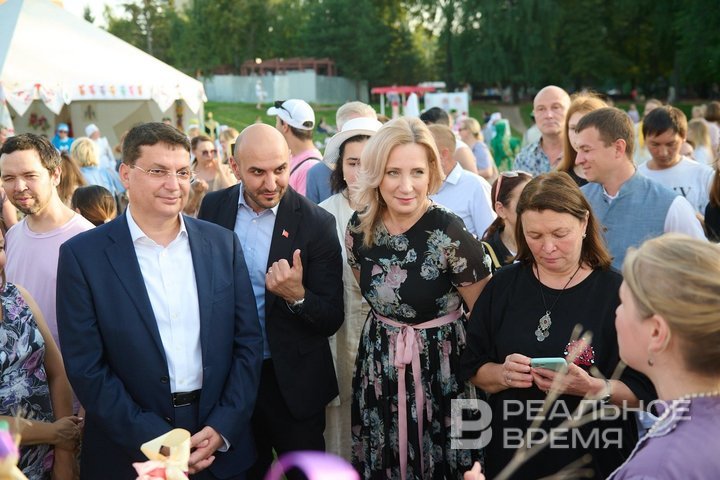
One could enter each courtyard through a stylised gate. The journey began with Tatars from Saba Districts where the guests were shown a ritual when the mother-in-law places a pillow under the bride’s feet before entering the house.
Nearby, at another courtyard, Kryashens from Mamadysh danced representing their national wedding ceremony. “We represent the Russians of Tatarstan,” the next tent claimed. And Bashkirs joked that they were representing Kirovsky District of Kazan. Chuvash people from Cheremshan District as well as some other peoples offered guests not only pastries but also a glass of a strong drink.
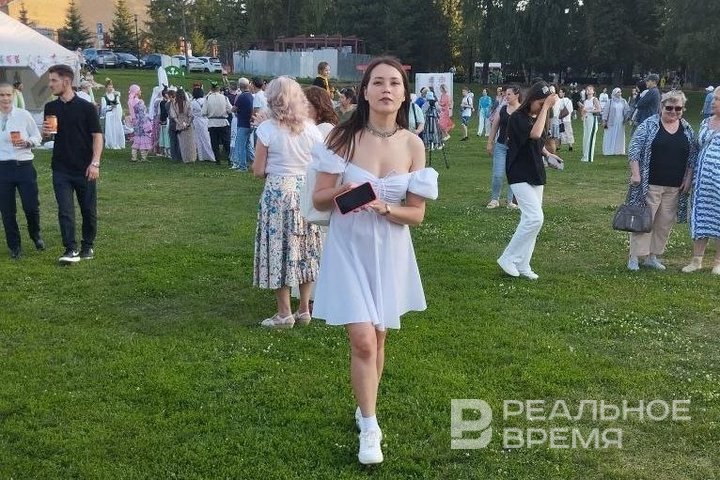
“One of the Chuvash rituals that has been preserved is that before the wedding, the bride buys lace net for the windows for her mother-in-law’s house and hangs them around the house,” recalled ethnic blogger Ksenia Romanova. “There is matchmaking: the groom’s relatives come to negotiate the wedding. Stylized weddings with ethnic elements in Chuvash costumes are held now. But I want a wedding for 15 people, that’s all.”
The Udmurts turned out to be from Kukmor: they handed out money to the guests and offered to put banknotes on a shovel so that they would be allowed to pass through the gate.
“Yes, these are our neighbours,” noted the Mari people from Kukmor and confirmed that now their youth also want to hold weddings with elements of national rituals.
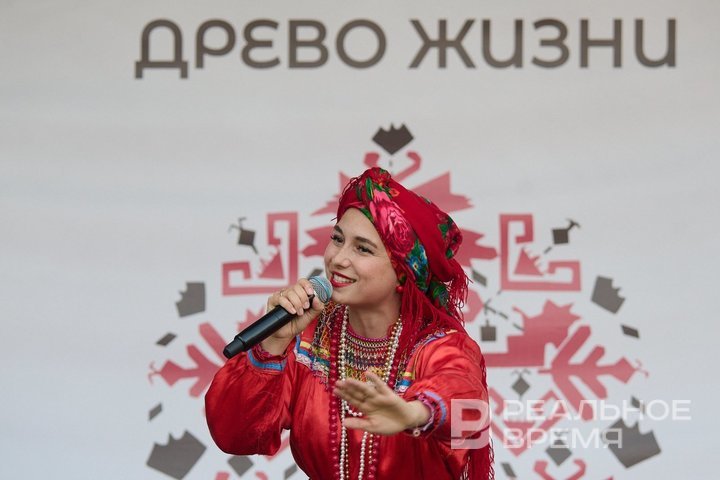
“Oh, I have bees, I don’t have time!”
Maria Stuklova, who is Moksha and vocalist of Zakaria quartet and chairwoman of the Youth Assembly of the Peoples of Tatarstan, was responsible for the Erzyan grandmothers who came from Tetyushi District. She said that according to a Mordovian tradition, a wedding lasts ten days.
“The groom in this area should have a honey keg,” says Stuklova. “I come to them saying: ‘Oh, I have bees, I don’t have time!’ Bees and fish. In modern times, only ransom has survived among these things. Everyone runs away from this, assimilates. I had an ordinary traditional wedding. Chairwoman of a regional national and cultural autonomy of Mordva people Natalya Sabitova, had a traditional one. And these grandmothers (I went on an expedition to them), even they had nothing of this.”
Master classes were held on the other side of the clearing. Here, for example, they made clay toys. But the biggest buzz was around baking the groom’s meat pastry peremech — one could make them oneself and immediately cook them in a deep frying pan.
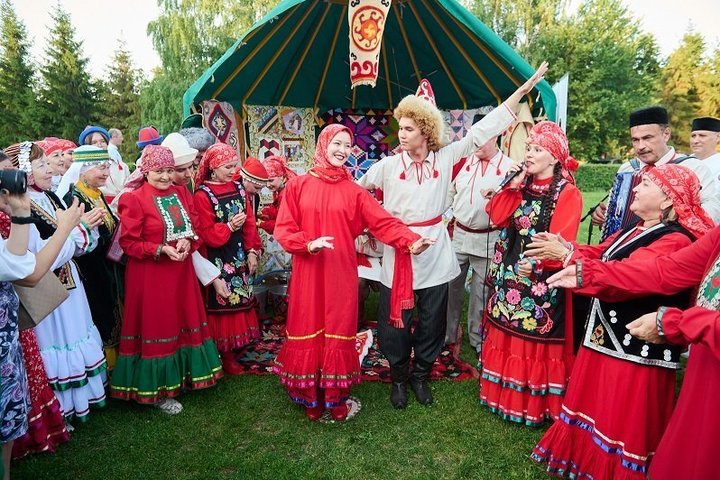
There was Wedding Rituals of Volga Peoples through the Eyes of 20th-21st-century Photographers photo exhibition in the middle of the clearing, while music performances coexisted with rituals at a concert venue. For example, here host Ayzilya Batyrkhanova portrayed a sad bride.
A fragment of the wedding with instructions to the future couple was shown by Uyav folk band from Cheboksary. From a music perspective, the most memorable trio was Azvesyam (“Silvered”) from Izhevsk that performed music on instruments such as kubyz (violin), uzygumy (flute) and krez (harp). As the vocalist proudly noted, university teacher Veronika Fyodorova played the latter.
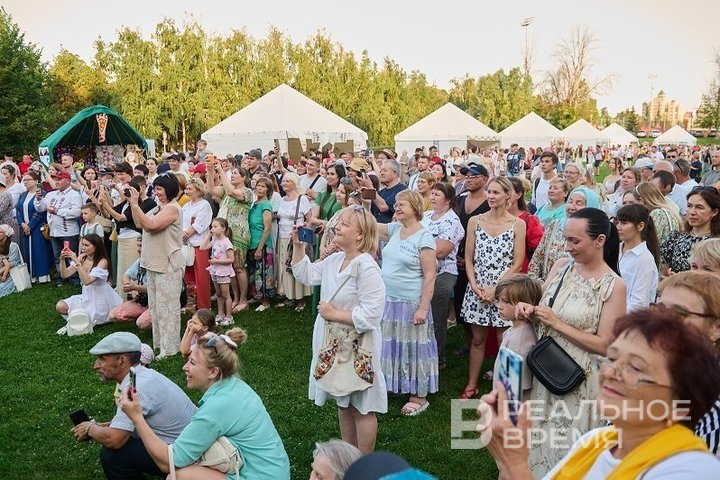
“Now the search for something new is found in the past”
The celebration, which lasted more than two hours, ended with a parade of brides and grooms: it was impossible to notice that sometimes an older woman was paired with a young man. And in general, of course, one would like to see younger people not among the spectators but among the performers and tent participants.
“But here, among the Udmurts of Tatarstan, they even shoot at weddings,” Pavel Alexandrov, singer of Shoner Paul and leader of Burdomurt band decreased Realnoe Vremya correspondent’s certain scepticism. “In Udmurtia, weddings are more modest, but here we live among the Tatars.”
He immediately greeted an old lady from Saby District in Tatar: “Hello, thank you for coming!”
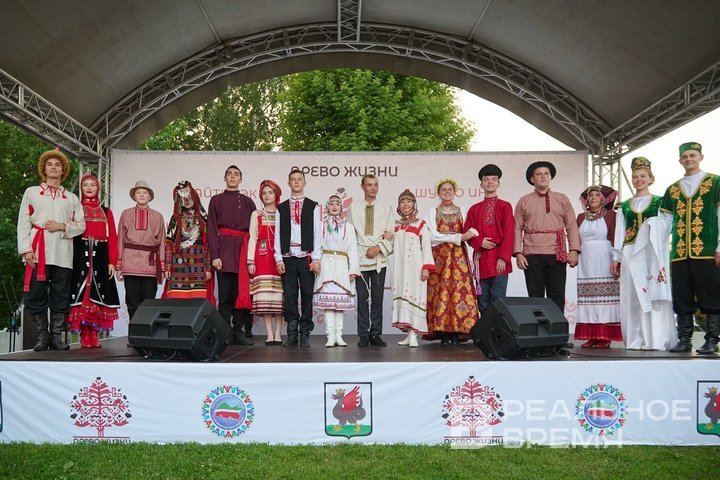
“I know weddings where people look for rituals and old ones are updated,” said Aysylu Leron, head of the Department of National Policy in Linguistic Culture of the Kazan Executive Committee. “My generation, for example, sought to hold weddings in a Western style, like in the movies. And now, the search for something new is found in the past. It is natural that many of the participants are elderly because precisely the older generation is the guardian of traditions.
As the organisers promise, after the weddin, there will be a celebration dedicated to the next stage in the family’s life, raising children. Rites of Childhood will be held in the same Gorky Park on 7 August, and Itil contemporary ethnic music festival will be hosted on 10 August.